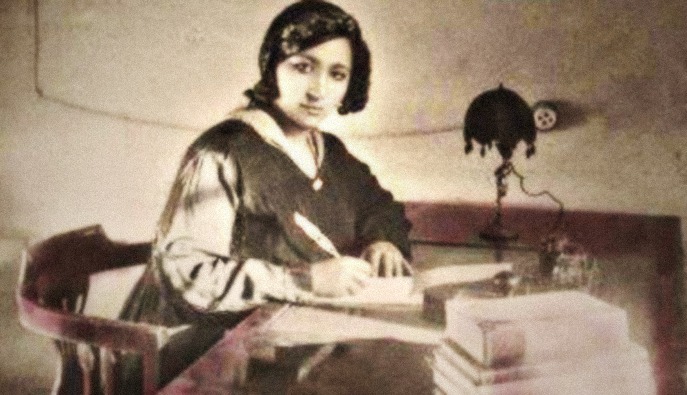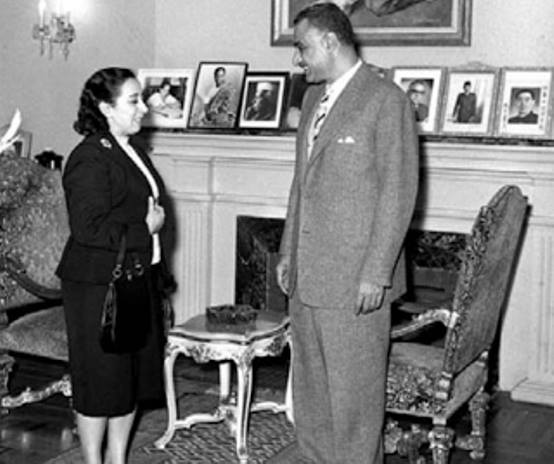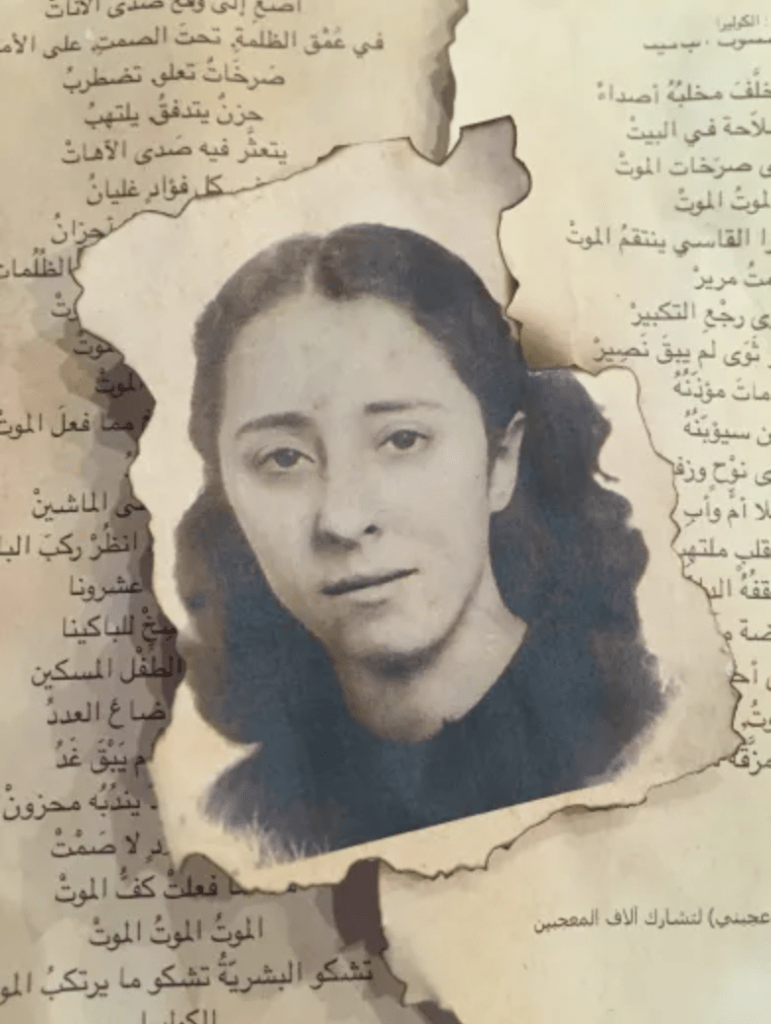The Iraqi poet Nazik al-Malaika in her poem ‘Love Song for Words’ poses the audience with a striking question, ‘why do we fear words?’ However, al-Malaika’s words were to be feared as they were able to change not only the foundations of modern Arabic literature and poetry forever, but also challenged ideas about the presence of women in the public sphere, the injustices of economic inequality, and gave a voice to the unheard.
Today, Nazik al-Malika would’ve turned 99 years old. Sadly, however, she parted from this world in 2007 in a hospital in Cairo at the age of 85, but she leaves behind her a wealth of poems and the lessons they can teach us to this day.
Al-Malaika was born in Baghdad in 1923 into an academic and artistic family who nurtured and encouraged her talents from a young age. Her father was a highly bookish teacher of Arabic with a great love for the intricacies of the language, while her mother was a famous and respected poet in her own right who had to use a male pseudonym to be able to get her work published. Undoubtedly a reflection of her mother’s inability to establish herself as a poet due to the time’s positioning of women in society, Nazik showed an immense drive to take advantage of a changing society and pursue what her mother wasn’t allowed to.
At a young age, Nazik al-Malaika already showed an intense appreciation of Arabic and poetry, and at the age of ten, penned her first poem in classical Arabic. As Nazik joined the Baghdad College of Arts, she soon joined other young Iraqis at the forefront of a pioneering artistic movement happening in Baghdad at the time. It was at this point Nazik began to be a trailblazer in modernist Arab literature, bravely standing apart from the strict rules and stylistic conventions of classical Arab poetry by establishing Arabic free verse, known also as taf’ila.

Arabic poetry had for centuries followed a strict system known as qasidah that dictated with the upmost rigidity each line’s length, rhythm, and even meaning. The structures and rules laid out by qasidah can be dated back to the pre-Islamic poets of the region and helped establish poetry’s prominence in the Arabic language and the Middle East. While qasidah could enable the production of poetic verses that appeared to reach perfection and established an unrivaled poetic legacy, in the 20th century much of these limitations began to appear as a straight jacket. The acceleration of technology and the rapid social change in societies that the 20th century brought could not be as easily expressed with these traditional forms, but instead called for something else to be better expressed.
Arguably, it was Nazik Al-Malaika’s publication of her poem The Cholera in 1947 that was the emergence of modern Arabic poetry and the simultaneous casting off the rules of a literary tradition. Addressing the dreadful cholera outbreak of the same year that laid waste to the Middle East, particularly in Egypt, the poem sought to express the horrors by using a free verse style that could replicate the sound and rhythm of the horse-drawn carts carrying away the dead that had become a depressing daily occurrence. Even for Nazik’s parents, the poem was too ahead of its time and they mocked it for its unconventionality. Her mother stated ‘What kind of rhyme is this? It lacks musicality.’ and her father likewise responded disapprovingly, yet Nazik famously rebutted that, ‘Say whatever you wish to say. I am confident that my poem will change the map of Arab poetry.’ Nazik was right and she did indeed change the history of Arab poetry.

The themes and issues addressed by Nazik al-Malaika still strike a cord to this day, with poems like To Wash Disgrace describing the tragedy of honor killing. Al-Malaika’s poems also often subtly and ingeniously invert patriarchal norms in Arab folk stories by replacing male protagonists and narrators with women. In al-Malaika’s heartbreakingly sad Three Elegies to My Mother, mourning the death of al-Malaika’s own mother, the traditional form of an elegy is dedicated to a female figure and not a male. Al-Malaika became known for her feminization of traditional forms and throughout her work’s championing of women, was seen by many as an important part of a uniquely Arab women’s liberation movement.
Nazik al-Malaika throughout her career always straddled the space between the traditional and the modern, standing in the middle with her foot in the door so the cool winds of tradition can soothe the hot atmosphere of modernity, and vice versa. Being simultaneously modern and traditional in her style and subject matter, al-Malaika built from a rich tradition of Arabic poetry and a wider cultural tradition she is evidently immensely proud of, but with a uniquely critical and unashamedly modern eye beckoning towards a more just future. Nazik al-Malaika was able to conceive of a truly modern Arab art form without replicating and defining oneself in relation to a Western cultural tradition. She refused to be categorized or pigeon-holed into being Western or Eastern, modern or traditional, or any other careless dichotomy we often use, but instead represented and reflected a deeper truth about the modern Middle East, that of its complexity and diversity.
The following are three of Nazik al-Malaika’s poems and the lessons they can teach us.
On identity in Who am I?
The night asks who am I?
I am its secrets-anxious, black, profound
I am its rebellious silence
I have veiled my nature, with silence,
Wrapped my heart in doubt
And solemn, remained here
gazing, while the ages ask me,
Who am I?
The wind asks who am I?
I am its confused spirit, whom time has disowned
I, like it, never resting
continue to travel without end
continue to pass without pause
should we reach a bend
we would think it the end of our suffering
and then-void
Time asks who am I?
I, like it, am a giant, embracing centuries
I return and grant them resurrection
I create the distant past
From the charm of the pleasant hope
And I return to bury it
to fashion for myself a new yesterday
whose tomorrow is ice.
The self asks me who am I ?
I, like it, am bewildered, gazing into shadows
Nothing gives me peace
I continue asking-and the answer
will remain veiled by mirage
I will keep thinking it has come close
but when I reach it- it has dissolved,
died, disappeared.
On being forgotten after you die in Elegy for a Woman of No Importance
She died, but no lips shook, no cheeks turned white
no doors heard her death tale told and retold,
no blinds were raised for small eyes to behold
the casket as it disappeared from sight.
Only a beggar in the street, consumed
by hunger, heard the echo of her life—
the safe forgetfulness of tombs,
the melancholy of the moon.
On mourning a loved one in The Black Flower
We left our dearest treasure here,
then hurried back after a spell
and searched for it both far and near,
but found nothing behind the hill.
We stopped to ask a forest hill
and whispered in the cypress’ ear:
the first said that she’d never tell,
the last pretended not to hear.
But dawn sustained us with her light
and showed us, in the treasure’s place,
a flower: black, as dark as night,
watered with tears, showing her face.
When visited by morning winds,
she fills the air with melody,
and hides inside her quiet hymns
the tears of all humanity.
She is our sad and sleepy flower:
her black petals hold our past.
We cried for her, then carried her
with memory, then left at last.
WE SAID THIS… Why Mahmoud Darwish Should Be On The Top Of Your Reading List This World Poetry Day!



